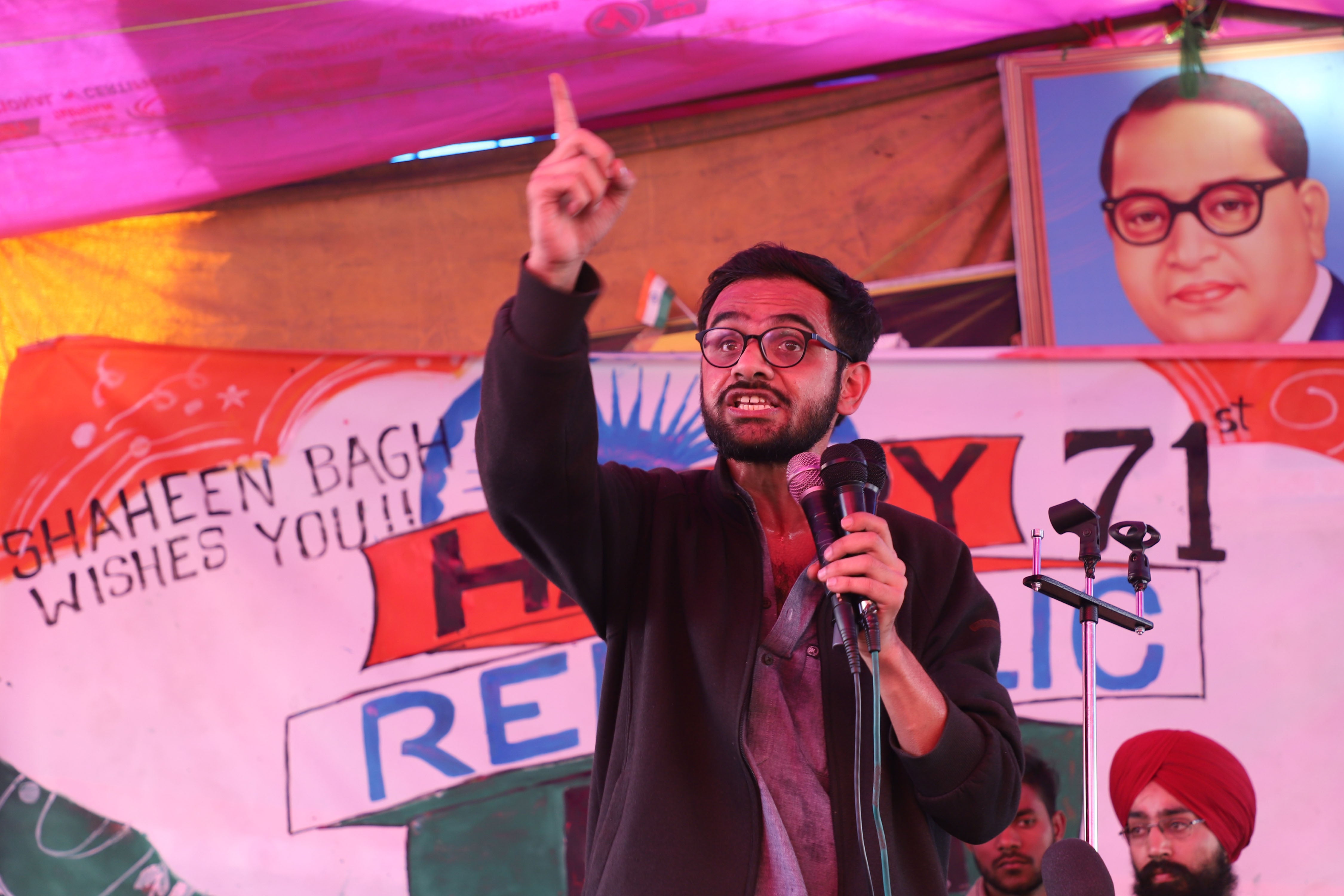India: Arrests of Activists Politically Motivated

(New York) – The Indian authorities are increasingly bringing politically motivated cases, including under severe sedition and terrorism laws, against critics of the government, Human Rights Watch said today.
The authorities should immediately drop baseless charges against activists, academics, student leaders, and others, and unconditionally release those in custody. On September 13, 2020, Delhi police arrested Umar Khalid, an activist, as one of the “main conspirators,” under India’s principal counterterrorism law for his alleged role in communal violence in February that killed at least 53 people and injured hundreds. Police in Delhi have also named academics, activists, and opposition leaders as suspects. On September 7, the National Investigation Agency arrested three members of a Dalit cultural group for giving speeches allegedly inciting caste-based violence in Bhima Koregaon in Maharashtra state in January 2018. In both cases, supporters of the ruling Bharatiya Janata Party (BJP) were implicated in the violence. “Indian authorities seem increasingly determined to prosecute without basis peaceful critics of government policies for violence that, by objective reporting, is largely the handiwork of BJP supporters,” said Meenakshi Ganguly, South Asia director. “By arbitrarily arresting outspoken activists, the government is not only attempting to silence dissent but also sending a message to supporters that they have free rein to commit abuses against minority communities.” Dozens of human rights defenders, activists, and academics are already in jail on politically motivated charges.
The Delhi police also identified others whose names, they said, had come up during the investigation, including: Sitaram Yechury, a well-known opposition politician; Jayati Ghosh, an economist; Yogendra Yadav, an activist and academic; Apoorvanand, a Delhi University professor; and Rahul Roy, a documentary filmmaker. The arrests have been widely condemned in India and abroad, including by retired police officers and judges, and United Nations experts who said they seem “clearly designed to send a chilling message to India’s vibrant civil society that criticism of government policies will not be tolerated.” In September, over 1,000 activists, journalists, academics, and others condemned the Delhi police’s alleged practice of coercing “confessional” statements to falsely implicate people in the February violence. On September 1, Khalid wrote to the Delhi police commissioner alleging that the investigators were putting pressure on his acquaintances to implicate him in the violence. Since June 2018, the authorities have arrested 12 prominent activists and academics under the counterterrorism Unlawful Activities (Prevention) Act in the Bhima Koregaon case: Sudha Bharadwaj, Shoma Sen, Surendra Gadling, Mahesh Raut, Arun Ferreira, Sudhir Dhawale, Rona Wilson, Vernon Gonsalves, Varavara Rao, Anand Teltumbde, Gautam Navlakha, and Hany Babu.
The authorities allege that they support a Maoist insurgency and, at a large public rally on December 31, 2017, incited Dalits to violence, leading to clashes with BJP supporters the following day. One person died and several were injured. However, the charges filed by police cite flimsy and contradictory evidence and possible tampering by the police. Two retired judges, who say they were the “main organizers and sole funders” of the rally, have said that most of the activists arrested in the case had nothing to do with the event.
The march organizers said that they wanted to open a campaign against the pervasive ideology in India that leads to attacks on Dalits and Muslims.
The authorities are investigating several other academics in this case. Other activists, academics, and students of these professors have called this a “witch hunt,” a deliberate harassment, as one statement said, “which is destroying our democracy, violating civil liberties, and subverting the Constitutional order.” While Maharashtra authorities under the former BJP-led state government used the case to jail critics of the government, they did not pursue investigations in cases that implicated Hindu nationalist leaders for inciting the violence. Similarly, with respect to the February violence in Delhi, the authorities have accused activists, student leaders, opposition politicians, and academics, but failed to act against BJP leaders who advocated violence against those peacefully protesting the citizenship law and policies that discriminated against Muslims in the weeks preceding the violence. Some of these leaders called the protesters “traitors” to be shot. A July report by the Delhi Minorities Commission said the violence in Delhi was “planned and targeted,” and found that the police were filing cases against Muslim victims for the violence, but not taking action against the BJP leaders who incited it. Discrimination Against Muslims under India’s New Citizenship Policy Download the full report in English As Human Rights Watch and others have also documented, the authorities have shown clear bias in the investigations, arresting peaceful protesters and filing charges, without evidentiary support, of sedition, murder, and terrorism under the Unlawful Activities (Prevention) Act, accusing them of a “conspiracy” to “defame the country in the international arena.” Indian authorities should uphold the rights to freedom of expression, association, and peaceful assembly.
The government should act to repeal or substantially revise the counterterrorism law as well as repeal the colonial-era sedition law to end the abuses committed under these laws. “The Indian authorities are increasingly using authoritarian tactics to punish peaceful protests, while failing to act against violent attacks by its supporters,” Ganguly said. “This is causing lasting harm to India’s justice system and further shielding the police from accountability for abuses.”.
Read the full article at the original website
References:
- https://www.hrw.org/asia/india
- https://www.hindustantimes.com/india-news/umar-khalid-/story-lj2XPxkP50PNZ10oHIlACI.html
- https://www.thehindu.com/news/national/delhi-violence-death-toll-rises-to-53/article30992113.ece
- https://zeenews.india.com/india/sitaram-yechury-yogendra-yadav-jayati-ghosh-not-charged-in-delhi-riots-chargesheet-clarifies-police-2309315.html
- https://theprint.in/india/nia-arrests-3-members-of-kabir-kala-manch-for-inciting-violence-in-bhima-koregaon/498241/
- https://www.hrw.org/about/people/meenakshi-ganguly
- https://thewire.in/rights/nine-former-police-officers-call-delhi-riots-investigation-flawed
- https://www.livelaw.in/top-stories/state-using-iron-hand-to-curb-free-speech-justice-lokur-expresses-concerns-over-use-of-sedition-laws-uapa-162901
- https://www.ohchr.org/EN/NewsEvents/Pages/DisplayNews.aspx?NewsID=26002&LangID=E
- https://scroll.in/latest/972241/delhi-violence-stop-coercing-false-confessions-to-manufacture-evidence-1000-citizens-tell-police
- https://www.hrw.org/news/2020/04/15/india-activists-detained-peaceful-dissent
- https://www.ndtv.com/india-news/bhima-koregaon-arrests-5-600-page-chargesheet-has-many-weak-links-1968335
- https://thewire.in/rights/discrepancies-bhima-koregaon-investigation-sharad-pawar-demands-fresh-probe
- https://cjp.org.in/the-truth-about-the-elgaar-parishad/
- https://scroll.in/article/892631/they-want-fascist-forces-to-reign-retired-judges-who-organised-elgar-parishad-speak-out
- https://www.huffingtonpost.in/entry/bhima-koregaon-nia-satyanarayana-kv-kumarnath-partho-sarathi_in_5f55d726c5b62b3add42feeb?utm_hp_ref=in-news
- https://thewire.in/rights/statement-rakesh-ranjan-du-professor-nia
- https://scroll.in/article/892601/bhima-koregaon-case-pune-police-is-not-pressing-charges-against-hindutva-leader-sambhaji-bhide
- https://www.hrw.org/news/2019/12/11/india-citizenship-bill-discriminates-against-muslims
- https://www.hrw.org/report/2020/04/09/shoot-traitors/discrimination-against-muslims-under-indias-new-citizenship-policy
- https://www.slideshare.net/sabrangsabrang/delhiriotsfactfinding2020?ref=https://sabrangindia.in/article/north-east-delhi-riots-minorities-commission-investigations-reveal-role-delhi-police
- https://www.hrw.org/news/2020/07/17/indias-police-found-complicit-anti-muslim-mob-violence
- https://www.hrw.org/sites/default/files/report_pdf/india0420_web_0.pdf
- https://www.hrw.org/news/2020/06/15/india-end-bias-prosecuting-delhi-violence
- https://thepolisproject.com/wp-content/uploads/2020/08/Manufacturing-Evidence-.pdf
- https://thewire.in/communalism/the-delhi-violence-firs-are-like-blank-cheques-to-be-encashed-by-the-police-any-time
- https://www.thequint.com/news/india/delhi-riots-trump-visit-police-conspiracy-theory-tahir-hussain-umar-khalid
